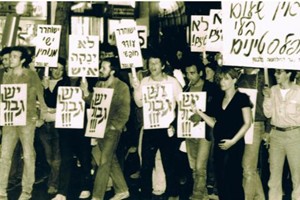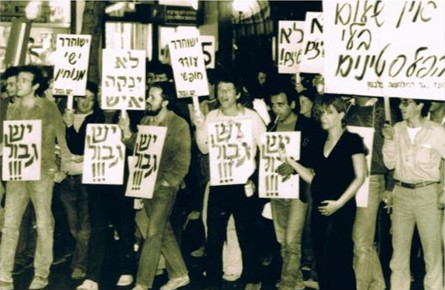
June 6 marks the 30th anniversary of Operation “Peace for the Galilee”, aka the First Lebanon War. According to well-know historian Avi Shlaim, the real driving force behind the Israeli invasion to Lebanon was the defense minister Ariel Sharon. One of his aims was the destruction of PLO military infrastructure in Lebanon and undermining it as a political organization, in order to facilitate the occupation of the West Bank and Gaza by Israel. The second aim was the establishment of a right-wing government in Lebanon in harmony with the US imperialism interests in the Middle East, the third aim was the expelling of Syrian army from Lebanon. Also, according to Shlaim, with the completion of Israeli withdrawals from occupied Sinai in March 1982, under the terms of the Egyptian-Israeli Peace Treaty, the Likud-led government of Israel hardened its attitude to the Arab world and became more aggressive.

Demonstration against the Lebanon invasion, June 1982 (Archive Photo: Zo Haderech)
In the voting in the Knesset on the war, only Hadash (the Democratic Front for Peace and Equality – Communist Party of Israel) opposed the war and even submitted a no-confidence motion against the Israeli government. Hadash Knesset member and CPI General Secretary, Meir Vilner, said in the Knesset plenary session that: “The government is leading Israel to an abyss. It is doing something that in the course of time might lead to crying for generations.” In response, they were condemned, and calls were heard, among others from the editor of Yediot Aharonoth daily newspaper, to prosecute communists for “treason”. Zionist Left-wing Knesset members, including Shulamit Aloni and Yossi Sarid, were absent from the plenary for the vote. Even the Labour faction voted in support of the colonial war.
Heavy Israeli casualties, the disinformation of Israeli government leaders and the Israeli public by Israeli military, as well as political advocates of the campaign and lack of clear goals led to increasing disquiet among Israelis. This culminated in a large protest rally in Tel-Aviv leaded by the Peace Now movement, following the 1982 Sabra and Shatila Palestinian refugee camps massacre. Organizers claimed 400,000 people participated in the rally, and it became known as the “400,000 rally”, including thousands of reserve soldiers back from Lebanon
According to author Itzhak Laor (“Haaretz”, June 5, 2012) and anti-war activist: “Beirut was pulverized, and yet there was no opposition in Israel to the war, except that of the radical left, which from the start included, under the Hadash umbrella, Campus, a Jewish-Arab leftist student group, and the Committee for Solidarity with Bir Zeit University. On the third day of the war, these groups morphed into the ‘Committee Against the War in Lebanon,’ which led the struggle, first with 11 costly newspaper petitions signed by hundreds of people, and a series of demonstrations, some of which ended with people injured and arrested. The demand was ‘withdrawal now,’ because it was important to present the war from the outset as illegitimate. Looking back, it was the most important event in Israel’s politics of protest.”
“The war, the hundreds of activists assumed, was intended to destroy the PLO and prevent the establishment of a Palestinian state, and therefore it must be opposed. And it worked. Peace Now would not have eventually started its protests if it had not been concerned that it would ‘lose the street.’ The leftist Zionist newspaper Al Hamishmar said so specifically: Do not let “Rakach and Matti Peled” – referring to the Communist Party of Israel and the former general and radical peace activist, take over the peace camp. But the 150 members of the Israeli peace group Yesh Gvul who refused army service and went to prison, the wholesale avoidance of reserve duty, the posters, the graffiti and the demonstrations played key roles in the opposition.”
“Until 1985, this significant movement, without which the anti-war movement can not be imagined, did not dare challenge the legitimacy of the war or demand ‘withdrawal now,’ a theme that percolated down into public opinion. Those weren’t just a few communists in the streets chanting, ‘We will neither kill nor be killed in the service of the United States;’ Yesh Gvul’s transformation of a line of a famous children’s song to a version mentioning Israeli soldiers dying, was sung by soldiers en masse. For the first time in Israel’s history the army understood that it did not have a blank check to make war.”


